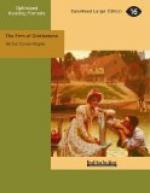While this little scene was being enacted in the lodgings of the student, a very stout little elderly man was walking slowly down Howe Street, glancing up at the numbers upon the doors. He was square and deep and broad, like a bottle of Geneva, with a large ruddy face and a pair of bright black eyes, which were shrewd and critical, and yet had a merry twinkle of eternal boyishness in their depths. Bushy side whiskers, shot with grey, flanked his rubicund visage, and he threw out his feet as he walked with the air of a man who is on good terms with himself and with every one around him.
At No.13 he stopped and rapped loudly upon the door with the head of his metal-headed stick. “Mrs. McTavish?” he asked, as a hard-lined, angular woman responded to his summons.
“That’s me, sir.”
“Mr. Dimsdale lives with you, I believe?”
“Third floor front, sir.”
“Is he in?”
Suspicion shone in the woman’s eyes. “Was it aboot a bill?” she asked.
“A bill, my good woman! No, no, nothing of the kind. Dr. Dimsdale is my name. I am the lad’s father—just come up from London to see him. I hope he has not been overworking himself?”
A ghost of a smile played about the woman’s face. “I think not, sir,” she answered.
“I almost wish I had come round in the afternoon,” said the visitor, standing with his thick legs astride upon the door-mat. “It seems a pity to break his chain of thought. The morning is his time for study.”
“Houts! I wouldna’ fash aboot that.”
“Well! well! The third floor, you say. He did not expect me so early, I shall surprise the dear boy at his work.”
The landlady stood listening expectantly in the passage. The sturdy little man plodded heavily up the first flight of stairs. He paused on the landing.
“Dear me!” he murmured. “Some one is beating carpets. How can they expect poor Tom to read?”
At the second landing the noise was much louder. “It must be a dancing school,” conjectured the doctor.
When he reached his son’s door, however, there could no longer be any doubt as to whence the sounds proceeded. There was the stamp and shuffle of feet, the hissing of in-drawn breath, and an occasional soft thud, as if some one were butting his head against a bale of wool. “It’s epilepsy,” gasped the doctor, and turning the handle he rushed into the room.
One hurried glance showed him the struggle which was going on. There was no time to note details. Some maniac was assaulting his Tom. He sprang at the man, seized him round the waist, dragged him to the ground, and seated himself upon him. “Now tie his hands,” he said complacently, as he balanced himself upon the writhing figure.
CHAPTER VI.
A RECTORIAL ELECTION.
It took some little time before his son, who was half-choked with laughter, could explain to the energetic doctor that the gentleman upon whom he was perched was not a dangerous lunatic, but, on the contrary, a very harmless and innocent member of society. When at last it was made clear to him, the doctor released his prisoner and was profuse in his apologies.




